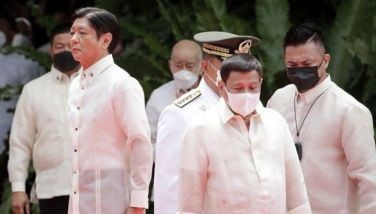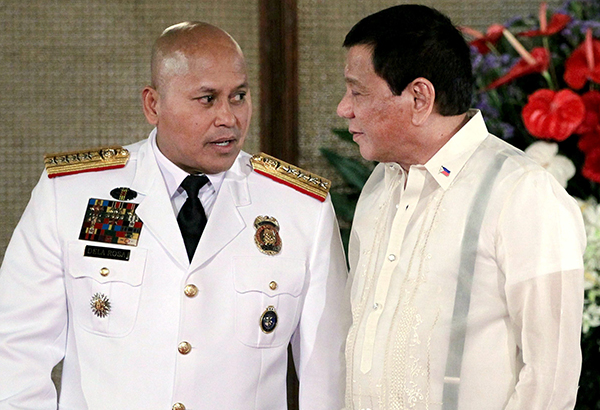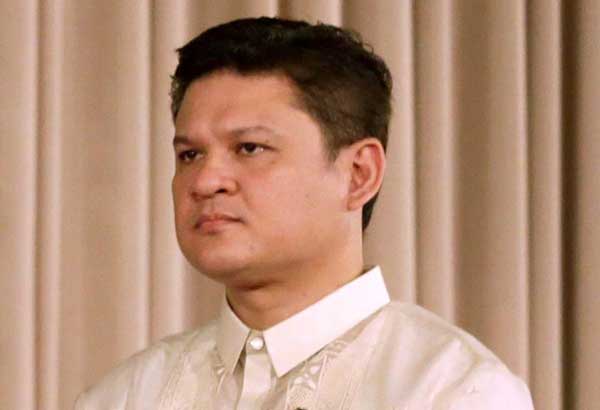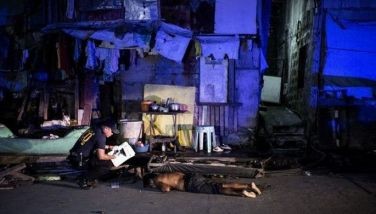Protests, political exercises not classified as terrorism — DOJ
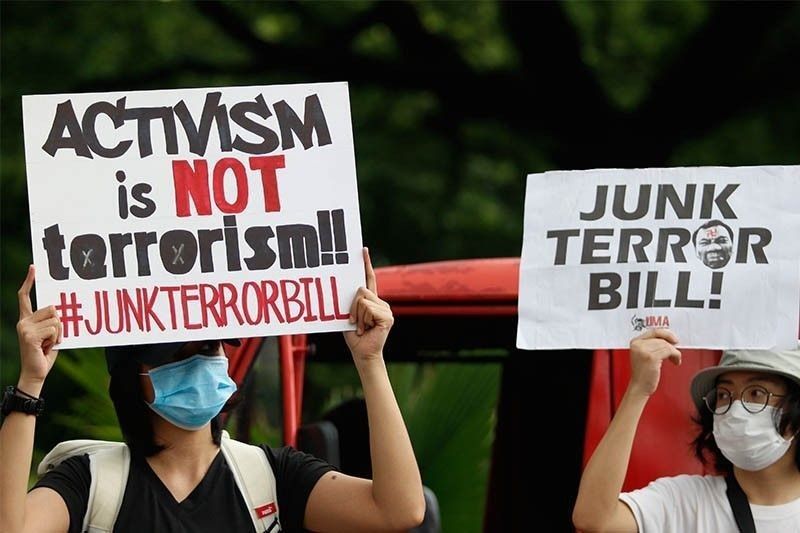
MANILA, Philippines — Straight from the horse's mouth: participating in civil and political exercises such as protest actions and demonstrations to express dissent are not classified as acts of terrorism, the Anti-Terrorism Council acknowledged Monday.
Speaking in an interview aired over dzMM TeleRadyo, ATC spokesperson Adrian Sugay said that the national government still has to abide by a set process before designating groups or individuals as terrorist elements, which he highlighted still requires probable cause.
He defined terrorism as largely intended to cause death, bodily injury, or extensive damage to property and infrastructure.
"We have to go into the definition of terrorism, and that's in the law and the IRR... Protesting against government and legitimate complaints are okay, there's no problem with that because you are within the exercise of your constitutional and civil and political rights. There is no problem there, and it's not terrorism," Sugay, also a justice undersecretary, said.
"If you look at the list of acts [in the law], these are quite heavy, and it should be clear to us what we mean by terrorism," he also said.
READ: Cheat sheet on the looming legal battle on the anti-terrorism law
The Anti-Terrorism Council is mandated to designate the persons who can be arrested as "terrorists" and is the lead body created by virtue of the controversial and widely-criticized Anti-Terror Law, which is facing 37 legal challenges before the Supreme Court as of this publishing.
The law's implementing rules and regulations, which were published by the justice department on Saturday, highlight that context must be considered in analyzing whether these materials do incite people to commit terrorism, a sentiment echoed by Sugay on Monday.
"If you do these things [to] intimidate the general public or create an atmosphere and spread the message of fear...you have to connect it to these acts mentioned earlier," he said.
"That's clear in the implementing rules and regulations, that there are some acts that cannot be considered as terrorism," he added.
From the interior department to the national police, government agencies have gone on the record to assure the public that dissenting voices will not be silenced by the law.
Under the law's IRR, advocacy, protest, dissent, stoppage of work, industrial or mass action, creative, artistic and cultural expressions, or other similar exercises of civil and political rights are not considered acts of terrorism as long as they are not intended to cause death or serious physical harm, endanger a person’s life, or create a serious risk to public safety.
The intentions perceived though remain wholly up to the ATC.
Even before the law's signing, critics and progressive groups have pointed out that activists, lawmakers, and even journalists critical of the administration have reported harassment, vilification, and even red-tagging at the hands of government supporters and, at times, state forces.
Int'l rights group: IRR only worsens Anti-Terror Law's risks
In a statement published Monday evening, human rights non-profit Amnesty International slammed the new implementing rules and regulations, saying they only worsen the risks posed by the law and calling on the Philippine government to scrap the "flawed" provisions of the law "instead of trying to justify them through the IRR.
"The IRR gives power to an Anti-Terrorism Council – composed of presidential appointees – to publish the names of those it designates on its own as ‘terrorists’. Such power contravenes international norms on due process and presumption of innocence," the statement read.
“It also arbitrarily flips a basic tenet of our justice system by pre-judging one as ‘guilty until proven innocent’. Such a change will be prone to abuse, given the government’s penchant for ‘red-tagging’, particularly human rights defenders and activists in Mindanao," it also said.
READ: Labeling dissent as rebellion 'institutionalized, normalized' in Philippines — UN report
Even the United Nations has acknowledged that the vilification of dissent and attacks against perceived critics of the Philippine government is being “increasingly institutionalized and normalized in ways that will be very difficult to reverse."
“The focus is diverted to discrediting the messengers rather than examining the substance of the message. This has muddied the space for debate, disagreement and for challenging state institutions and policies,” a UN report published in June read.
“The law is grievous to begin with. It violates international standards on human rights and counter-terrorism with its vague and overbroad definitions of ‘terrorism’ and the excessive powers it grants to the Philippine executive. It allows a pre-charge detention period of a maximum of 24 days, which greatly exceeds the norm under international standards. It empowers security forces to conduct surveillance, endangering individuals’ right to privacy," Amnesty International added in its statement.
“IRR or not, the anti-terror law is but an addition to the government’s arsenal of laws against government critics and civil society in general.”
President Rodrigo Duterte signed the Anti-Terrorism Law on July 3 despite opposition from rights groups and civil society groups that it could be used to stifle human rights.
A petition against the law has been filed at the Supreme Court and other groups are preparing pleadings of their own.
Follow this page for updates. Photo courtesy of The STAR/Michael Varcas
National Security Adviser Hermogenes Esperon moves to block access to several websites, including news sites of alternative news orrganizations Bulatlat.com and Pinoyweekly.org.
In his letter to the National Telecommunications Commission, he only says the websites are "affiliated to and are supporting these terrorists and terrorist organizations."
No other basis to back up his allegation was cited in the letter.
Citing the designation of the CPP-NPA-NDF as terrorists, NSA Hermogenes Esperon moves to block access to several sites.
— Kristine Patag (@kristinepatag) June 22, 2022
In Esperon's letter to the NTC, he included news sites @bulatlat and @pinoyweekly; sites of other progressive groups RMP and Save our Schools. @PhilstarNews pic.twitter.com/nAzMITJFsS
The Commission on Human Rights says it "partly welcomes" the Supreme Court decision that some parts of the controversial Anti-terrorism Law are unconstitutional.
CHR spokesperson Jacqueline de Guia says the commission remains hopeful that the remaining contentious provisions of the law will be clarified by the high cour in the full text of the decision.
"At the same time, our commitment remains in guarding against possible human rights violations arising from the implementation of the anti-terror law. We steadfastly remind the government that countering terrorism and protecting human rights are not competing values but are, in fact, mutual and complementary," De Guia says in a statement.
The Supreme Court has deliberated and voted on the controversial Anti-Terrorism Act but the decision will be released "at the soonest time possible."
"However, considering that there were numerous issues resolved in the case, as well as the fact that each Justice had to vote on each issue, there is a need to accurately confirm and tally the vote of each Justice in order to ensure the correct resolution of the Court per issue," SC spokesperson Brian Hosaka says.
The Anti-Terrorism Council designates the National Democratic Front of the Philippines, the panel that negotiates for communist rebels during peace talks a terrorist organization.
Previous designation of the Communist Party of the Philippines and New People's Army led to the designation of supposed members of the CPP's Central Committee. Among those designated as terorrists were peace consultants.
Designation gives the Anti-Terrorism Council the authority to investigate and freeze the accounts of designated persons.
The Anti-Terrorism Council has designated 29 people, including alleged members of the Communist Party of the Philippines-New People's Army, as terrorists in two resolutions.
Designation allows the Anti-Money Laundering Council to freeze the assets of those on the list.
- Latest
- Trending

















